General
Ngugi revitalizes Pan-Africanism as Mak honours Nyerere
Published
12 years agoon
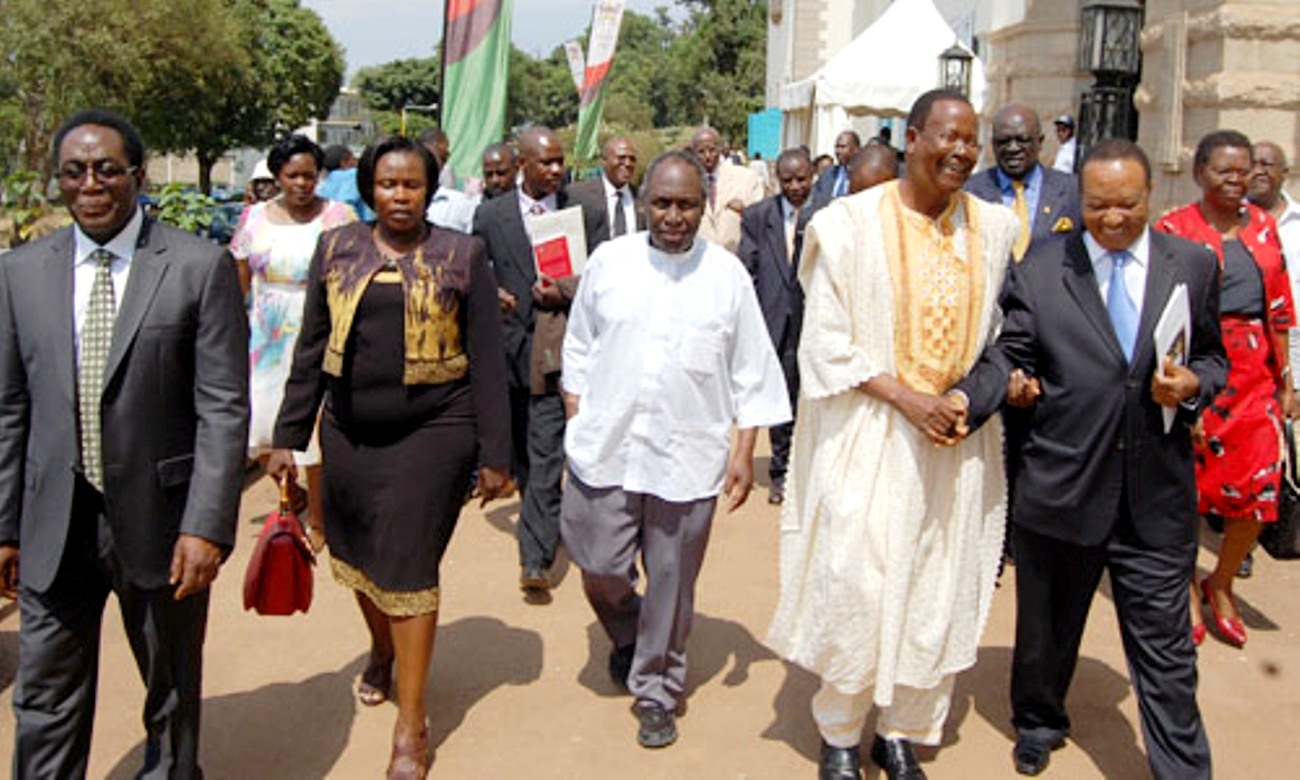
It is the 29th June 2013 at 2:00pm, the Makerere University Main Hall is bustling with activity as alumni, friends, staff members of Makerere University and well wishers stream in to join the historic commemoration of the University of East Africa, UEA, (1963 – 1970). The Main hall is filled with laughter as alumni greet each other with warm passionate hugs and handshakes. It has been years since they last saw each other. It has been years since they last shared a seat in this Main Hall. It has been years since they last returned to Makerere University, where it all started. Some of them have started graying and as they smile, the wrinkles on their faces emphasize the wisdom that only comes with age. All protocol is ignored for now. The alumni of UEA are simply happy to be back home. They walk in and out of the Main Hall to view the exhibitions on the side; as displayed by the three participating universities: Makerere University, University of Nairobi and University of Dar es Salaam. They finally settle in the Main Hall to participate in the other activities of the day.
The University Main Hall is at this moment transformed into what it was in the 1960s, when scholars from the continent and beyond came here to participate in powerful public debate and discourse. It was in this Main Hall that a strong spirit and sense of Pan Africanism was nurtured; a spirit that was to spread throughout the continent and cause major political paradigm shifts and result into independence of some of the African States. To bring this out clearly is the perfect choice of Africa’s celebrated writer, Prof. Ngugi wa Thiong’o, who is set to give a keynote address on ‘Makerere Dreams: Language and New Frontiers of Knowledge.’ Before the Keynote Speaker comes on stage, the Chairperson of Makerere University Council Eng. Wana Etyem welcomes all to Makerere University.
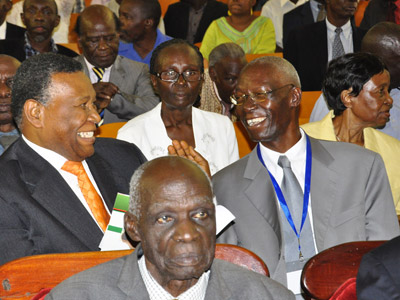
He reminds the gathering that this commemoration is part of the wider celebrations of 90 years of Makerere University and he is grateful for the initiators of the celebrations including former Acting Vice Chancellor, Prof. Venansius Baryamureeba. He is in the same vein grateful to the Vice Chancellor, Prof. John Ddumba-Ssentamu for steering the commemoration to such a tremendous moment. The Chairperson of Council is particularly grateful to the Government of Uganda for the continued support to higher education in the upcoming student loan scheme.
Amidst a thunderous applause, Eng. Wana Etyem then requests the alumni of the University of London and alumni of the UEA to stand up for recognition. They rise to their feet and wave to the crowd with wide jovial smiles. It is a happy hour.
The Keynote Speaker is introduced by the Makerere University Chancellor, Prof. Mondo Kagonyera. “I was one of the first students to register for the UEA degrees. I went to the University of Nairobi. UEA must have been an innocent victim of political ignorance. Is it possible to resurrect the UEA in one form or another?” he wonders. “It is now my singular honour and pleasure to invite Prof. Ngugi wa Thiong’o to give the key note address,” he adds, as the crowd gives a befitting welcome to this illustrious son of Africa, who confidently walks to the podium clad in a white long sleeved shirt and a smile on his face. The Main Hall is filled to capacity, the gallery overflows. In the audience are Government officials including the former Prime Minister Hon. Apolo Nsibambi, cultural representatives like the former Katikiiro of Buganda Eng. J.B Walusimbi, Political leaders like the UPC President Olara Otunnu, Members of Staff from MUASA, MASA and NUEI, representatives from the diplomatic missions and students from both Makerere University and neighboring Secondary Schools.
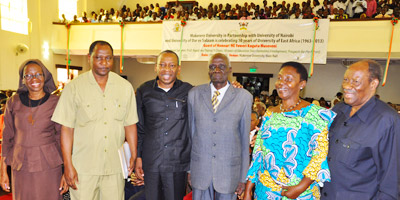
“I find it interesting that people ask me where I was educated every now and then. They hope I will say an American or British University. But I always say I was educated at Makerere University, and I wrote my books in Makerere, Kampala,” said Prof. Ngugi in his opening remarks. “I feel truly grateful for the honour of bringing me back to the scene of many incredible memories. It was on this hill that year after year beginning in 1961, we celebrated the realization of a dream fought for in the streets of Dar, Nairobi and Kampala for over sixty years. The Makerere Student’s Guild with its tradition of free and fair elections had already undermined the colonial practices but anticipated this moment. I entered Makerere University in July 1959, a colonial subject of white settler state and left in 1964, a citizen of an independent black Republic. In a way, Makerere of my time was a personal paradise. Makerere opened the space of my imagination,” he reminisced.
Prof. Ngugi decried the absence of continuous works in native languages. “What we can question is the fact that our various fields of knowledge of Africa are in many ways rooted in the entire colonial tradition of the outsider looking in. Our knowledge of Africa is largely filtered through European languages and their vocabulary. How many historians, Africans and non-Africans alike, have ever written a single document in an African language? How many researchers have even retained the original field notes in words spoken by the primary informant? I have seen prizes being announced for the promotion of African literature but only on condition that the entries are not in an African language. Can you imagine the horror it would raise if someone offered a prize for the promotion of French literature but only on condition that the participants write in Zulu?” he added. He rebuked African governments for turning their backs on African languages by denying them resources.
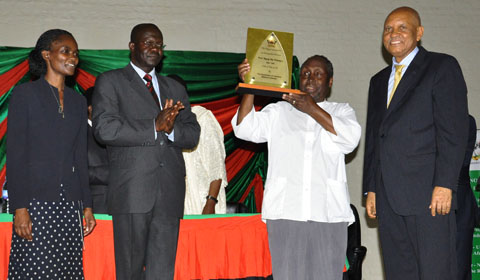
Dr. Okello Ogwang, Dean of School of Languages and Literature and Dr. Susan Kiguli of the same School, presented Prof. Ngugi wa Thiong’o with a plaque for his keynote address and also as a prominent alumni of the school. He had paid a courtesy visit to the School earlier in the morning. The Deputy Vice Chancellor in charge of Academic Affairs. Prof. Lillian Tibatemwa-Ekirikubinza, thanked Prof. Ngugi wa Thiong’o for the address adding that he had indeed sent the congregation into deep thought on the need to generate scholarly material in indigenous languages.
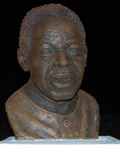
A key highlight of the commemoration was the launch of the Mwalimu Julius Nyerere book, ‘Women’s Freedom: Women are Eagles, Not Chickens,’ and the unveiling of the Mwalimu bust by His Excellency Yoweri Kaguta Museveni, who was represented by Tourism Minister, Hon. Ephraim Kamuntu. The bust stands tall in bronze mounted on a white pedestal in the garden between Edge road and the Makerere University Main Road, overlooking the Freedom Square. From its position, one could rightly say that the late Julius Nyerere, with a smile on his face as seen in this bust, is staring at the historic Freedom Square, to remind all graduating from this Square to stay true to their heritage and carry on the spirit of Pan-Africanism. “With these accolades as the only Chancellor of the University of East Africa which we are celebrating today, it is worthy to have a Mwalimu Julius K. Nyerere Monument on the Main Campus of Makerere University, his proud alma mater.
Mwalimu Nyerere’s efforts perhaps kicked off with his selflessness vision of a united Tanzania. President Nyerere and Sheikh Abeid Karume of Zanzibar were foresighted in uniting Tanganyika and Zanzibar to form Tanzania. The EAC later broke down in 1977 partly because the principled Nyerere was incompatible with Idi Amin,” said Hon. Kamuntu. The former Chairperson of Makerere University Council, Hon. Mathew Rukikaire, who doubles as a former Guild President of UEA in 1963, was grateful to President Yoweri Museveni for laboring to realize the dream of an integrated East Africa engineered by Julius Nyerere.
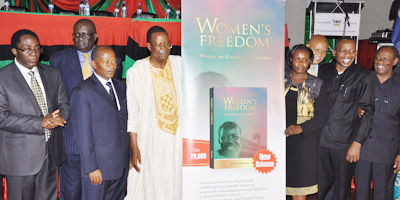
Hon. Charles Makongoro Nyerere, a son to the late Julius Nyerere and a Member of the East African Legislative Assembly, thanked the organizers for honouring his father and emphasized that if Nyerere’s book had been written in current times, it would have indeed brought out many more prominent women both at local and international levels, who have raised to high profile positions. He was also grateful that the Gender Mainstreaming Directorate at Makerere University had deemed it fit to dedicate the proceeds from the sale of Mwalimu Nyerere’s book to help bright but disadvantaged female students attain education. Hon. Makongoro made a humble appeal that something should be done to change the fact that his late father is still the only Chancellor of UEA. He said his father would not have been pleased to remain the only holder of this position forever. 99-year old Mzee Anania Akera, a former roommate of Nyerere in 1944, attended the function to the delight of all, especially the Nyerere family.
Two prominent alumni of the University of East Africa from each country were awarded for their service over the years. The awards were presented by Dr. Martin Aliker, the Chairperson Council of UEA assisted by David Kahundha Muhwezi, the Makerere University Secretary:
- From Makerere University; Prof. Charles Lwanga Mark Olweny, Professor Livingstone Sserwadda Luboobi and Mrs. Geraldine Namirembe Bitamazire, were awarded.
- University of Dar es Salaam awarded H.E President Yoweri Kaguta Museveni and Prof. Issa Gulamhussein Shivji.
- University of Nairobi awarded Prof. (Mrs) Florida Amakobe Karani and Eng. Austin Salmon Kitololo
The Vice Chancellors of participating universities shared their prospects of higher education:
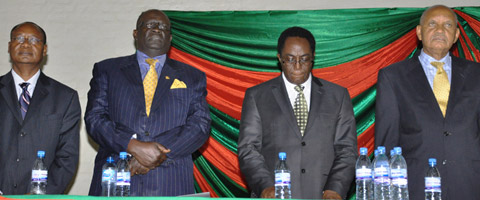
“It has been criminal to keep your child at home for the last 11 years in Kenya. This has been done diligently. A lot of money has been put into this. Kenya has a budget of 1.6 Trillion and education is going to take the biggest part of this budget. Government has invested highly in infrastructure and we now have 33 universities, 14 of which are fully chartered. This has expanded the capacity of the Kenyan students who are currently 370,000; both in private and public universities. Our greatest challenge is in Science and technology. The number of students doing science and technology is about 25% only,” said Prof. George Magoha, the Vice Chancellor of the University of Nairobi. “We have retained our staff because the government has been listening to staff unions. We collect six billion annually and are now focusing on training staff to write proposals. 25% of this budget comes from research,” he added
“The Uganda Vision 2040 provides plans and strategies to transform the Ugandan society from a peasant to a modern, prosperous and competitive upper middle-income country within 30 years. To attain this projected level of development, the country will have to exploit its enormous opportunities including oil and gas, tourism, minerals, ICT business, abundant youthful labour force, strategic geographical location, fresh water resources, industries and agriculture.
These opportunities can only be harnessed through strengthening the physical infrastructure; Science, Technology, Engineering and Innovation (STEI); and above all through concentration on human capital development,” said Prof. John Ddumba-Ssentamu, the Vice Chancellor of Makerere University.
“Some of the interviews for positions in the University of Dar es Salaam were held here. The instruments designed here, so Makerere was the cradle for Dar. Every visit here is an opportunity for us to extend our gratitude. I would like us to focus on the question of whether we still value quality education or we are simply focusing on big numbers of students. The numbers are high of universities, students, lecturers, etc, but we need to ponder on the quality. Do we appreciate the role of education in our emancipation? Yes the three universities are bigger but are they better? Are they universities or simply glorified high schools? Are our universities doing enough, like investing in cooperation amongst ourselves as opposed to cooperation with universities abroad only? Are we spending our meager resources wisely? The resources expended on administrative overheads could be spent in the active involvement of education? I am positive that we will prosper if we provide education in cooperation rather than competition,” advised Prof. Mukanadla Rwekaza, the Vice Chancellor of the University of Dar es Salaam.
A souvenir magazine for 90 years of Makerere University, highlighting the strides taken in research and innovations across the nine colleges of Makerere University and the School of Law, was launched by Education Minister, Jessica Alupo, as part of the celebrations. The magazine, Mak@90, is a product of a partnership between the Public Relations Office of Makerere University and The New Vision. The commemoration was sponsored by UNESCO, which was represented by the Secretary General, Mr. Augustine Omare-Okurut, and the Swedish Government represented by the First Secretary Dr. Patri Pohjolainen.
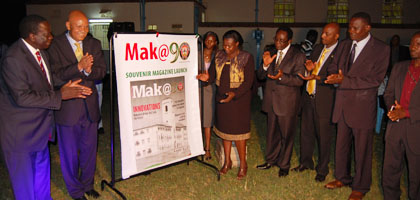
The Guests were treated to a cocktail to wind down the commemoration and entertainment from the Department of Performing Arts and Film (PAF).
Article by Marion Alina
Photo selection by Elias Tuhereze
You may like
-


Celebrating the Life of Prof. Livingstone Sserwadda Luboobi
-
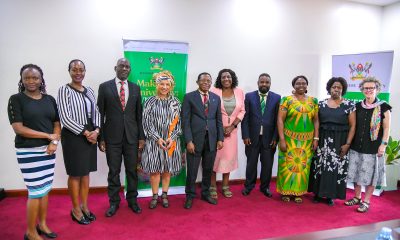

Mak, HERS-EA Discuss Nurturing More Women Leaders
-
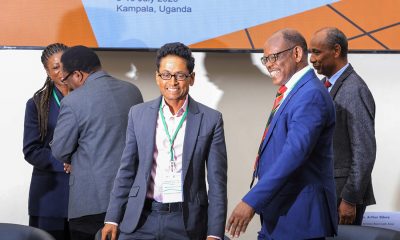

Makerere Hailed for Its Leadership in Health Policy and Knowledge Systems
-
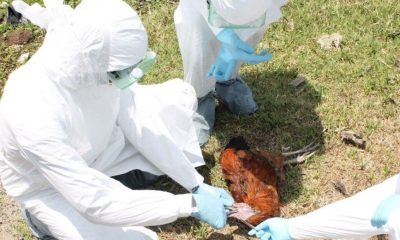

Advancing Regional Health Priorities Through the CARTA Research Hubs
-
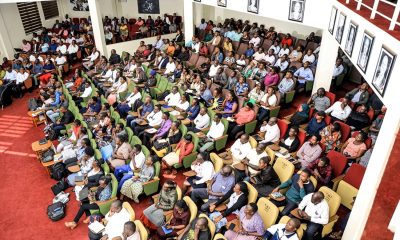

Call for Abstracts: 2nd East African Symposium and Expo on Trauma, Injuries, and Emergency Care – 2025
-
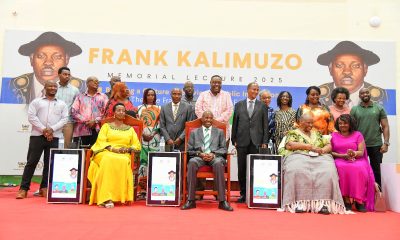

Mirror Frank Kalimuzo’s life of service-MUBS Principal
General
Simplicity, Service & Scholarship: Hallmarks of Professor Livingstone Luboobi’s Legacy
Published
10 hours agoon
July 18, 2025By
Eve Nakyanzi
On Wednesday 16th July 2025, Makerere University lost one of its most cherished sons, Professor Livingstone Sserwadda Luboobi. Described as a mathematician, academic leader, and humble servant, Professor Luboobi devoted more than five decades to the university, rising through the ranks to become Vice Chancellor, and leaving a legacy defined by simplicity, service, and scholarship.
Born to Lameka Serwadda and Sanyu Serwadda on 25th December 1944 in Mitondo, Kalisizo, Kyotera District, Professor Luboobi’s academic career begun as a third-year student at Makerere and continued with unwavering loyalty until his passing. His life’s work reflected not only a commitment to mathematics but also nurturing generations of scholars and leaders across Uganda and beyond.
A funeral service was held in his honour at St. Francis Chapel, Makerere University on 18th July 2025. It was a moment of solemn remembrance and heartfelt tribute. Rev. Canon Dr. John Senyonyi delivered the sermon titled “Only God Knows,” reminding mourners of the mystery and grace of life’s journey. Rev. Canon Geoffrey Byarugaba represented the Kampala Diocese at the service, while former St. Francis Chaplain, Rev. Dr. Canon Johnson Ebong thanked Professor Luboobi for spearheading the Chapel’s expansion. Friends, colleagues, and family members filled the chapel, joined in mourning but also in gratitude for a life that had deeply touched theirs.

Mrs. Lorna Magara, Chairperson of the University Council, spoke movingly about Professor Luboobi’s faithfulness, likening his life to the biblical call in Mark 10:43, “Whoever wants to become great among you must be your servant.”
In his condolence message, the Vice Chancellor, Professor Barnabas Nawangwe, hailed Professor Luboobi as a visionary leader whose legacy is deeply woven into Makerere’s identity as a research-led institution. He credited Professor Luboobi with laying the groundwork for a culture of inquiry—championing graduate programmes, encouraging doctoral training, and fostering international collaborations that strengthened the university’s research profile. “He believed in building systems, not just structures,” noting that many of Makerere’s current research policies stem from his leadership. Even in retirement, Professor Luboobi remained a source of wisdom and guidance, quietly shaping the future of the university he so deeply loved.
Speaker after speaker painted a portrait of a man who led not by pomp, but by quiet strength and deep conviction. The Principal, Professor Winston Tumps Ireeta, speaking on behalf of the College of Natural Sciences (CoNAS), described Professor Luboobi as a foundational figure whose influence is deeply etched in the structures and spirit of the college. He spoke with emotion about Luboobi’s unwavering commitment to academic integrity and his belief in the power of mentorship.

“He was not just a mathematician,” Professor Ireeta said, “he was a visionary who understood the soul of the university. Even in retirement, he remained an advisor, a guide, and a quiet force of wisdom.” He concluded by saying that the college would continue to draw from his example as it navigates the future of science and innovation in Uganda.
Professor Luboobi’s illustrious career at Makerere University included serving as Head, Department of Mathematics from 1990 to 1991. The current Head of Department, Dr. Ismail Mirumbe remembered him as a pillar in the teaching and development of mathematics in Uganda
Professor John Mango, who served as Head, Department of Mathematics during Professor Luboobi’s term as Vice Chancellor from 2004 to 2009 described him as a towering figure of integrity and principle, someone who not only upheld the highest standards of academic conduct but insisted that others around him do the same. “He was a pillar in the department,” Prof. Mango remarked, “and his moral compass was unwavering.”

He recalled instances where Professor Luboobi made firm decisions, including terminating contracts when integrity was compromised, setting a tone that shaped the department’s reputation for honesty and excellence. Even as Vice Chancellor, he remained deeply involved in the department’s affairs, teaching, supervising students, all the while handling top administrative duties punctually. Prof. Mango spoke with great admiration of a man who led by example, mentored many, and whose contributions to mathematics education, research, and policy-making continue to shape the future of the discipline in Uganda and beyond.
According to an article from 1990 written by Dr. Vincent Ssembatya and Andrew Vince at the University of Florida, the Uganda Mathematical Society (UMS), which was formally established on 25th November, 1972 has since inception enjoyed major support from Makerere University and Kyambogo University in terms of infrastructure and leadership. Professor Paul Mugambi, who was also present at Professor Luboobi’s funeral service was elected first president of the UMS. Dr. Saul Nsubuga from the Department of Mathematics represented UMS at the service, honouring Professor Luboobi’s pioneering role in the discipline.
The service also featured tributes from close friends and family. Loved ones shared stories of a man who remained grounded no matter how high he rose, a man who valued relationships and walked closely with his faith. His children and grandchildren remembered him as a father who was ever-present, a listener, and a source of steady guidance.

Professor Daniel Kibuule, son of the late Professor Luboobi and Dean, Faculty of Health Sciences at Busitema University, delivered a deeply personal tribute that painted a full portrait of his father’s life, values, and final days. He expressed gratitude to the University leadership, family, friends, and medical professionals who stood with them during a challenging period. He particularly thanked his siblings, Dr. David Kimera and Dr. Irene Nakiyimba for their unwavering role in caring for Professor Luboobi through illness.
He spoke of a man who, despite great academic accolades, remained deeply humble and committed to discipline, simplicity, and faith. From instilling punctuality and responsibility to ensuring his children charted their own paths, none bearing his surname “Luboobi”, Prof. Luboobi was intentional in every lesson he passed on. Kibuule recalled his father’s insistence on being at home even in his final moments, his strong connection to Christ, and his quiet strength despite his failing health.
Former students and mentees echoed the same sentiments, of a teacher who was generous with his time and invested deeply in others’ growth. The community that gathered was not only there to grieve but to celebrate the quiet legacy of a man whose example continues to live on.
Among the mourners were public figures and leaders, including Hon. Abed Bwanika, Member of Parliament for Kimanya-Kabonera, Hon. Nyombi Thembo, the Executive Director Uganda Communications Commission, and Hon. Dr. Ham-Mukasa Mulira, former Minister of ICT, among others.
In his passing, Makerere University has lost a pillar, but his life reminds us that greatness lies in consistency, in humility, and in service to others. Professor Luboobi’s memory will continue to live on in the minds he shaped, the systems he built, and the values he embodied. He ran his race with grace.
The Writer is a Volunteer in the Public Relations Office, Makerere University
Please click the embedded video below to view the service livestream
General
Public University Legal and Accounting Officers Trained on Governance and Compliance
Published
2 days agoon
July 17, 2025By
Eve Nakyanzi
Legal and accounting officers from public universities across Uganda have convened, for a high-level training workshop organized by Makerere University. The three-day training, taking place from July 16th to 18th, 2025, is aimed at strengthening legal frameworks, improving institutional governance, and ensuring compliance with public finance and procurement laws within higher education institutions.
Ms. Lorna Magara, Chairperson of the Makerere University Council and Guest of Honour at the opening session, commended the initiative as timely and necessary. She addressed the growing backlog of court cases affecting Makerere and other public universities and outlined measures already taken to mitigate legal risks. These include the establishment of a Legal Rules and Privileges Committee and the Directorate of Legal Affairs, part of a broader strategy to improve legal compliance and foster good governance.
Representing the Vice Chancellor, Prof. Winston Tumps – Ag. Deputy Vice Chancellor (Finance and Administration), described the training as both strategic and practical. “It is imperative that we learn from each other, especially in how we handle employee litigation and institutional legal risks,” he remarked. He added that the program is designed to promote experience-sharing across universities and enhance collective institutional growth.

In his address, Mr. Yusuf Kiranda, University Secretary at Makerere University, emphasized the urgent need for robust legal oversight and more effective case management mechanisms within public universities.
The training featured a keynote address by the Attorney General of Uganda, Hon. Kiryowa Kiwanuka, who provided critical insights into legal expectations for public institutions. He warned that failure to heed legal advice could result in personal liability for accounting officers, citing a precedent involving the Uganda Cancer Institute. “Universities must consult the Attorney General’s chambers before entering into major contractual obligations,” he advised, urging legal officers to document decisions meticulously as proper record-keeping forms the first line of defense in legal disputes.

Hon. Kiwanuka further discussed the government’s ongoing efforts to recentralize legal services to ensure alignment with the Attorney General’s office. He cautioned in-house counsel against becoming overly entangled in decision-making processes, stressing the need for objectivity. Other key issues he addressed included contract approvals, misuse of Memoranda of Understanding (MoUs), and lapses in procurement processes, particularly at the close of financial years.
Participants also benefited from insights by Hon. Justice Musa Ssekaana of the Court of Appeal, who offered an in-depth analysis of judicial review and its significance in promoting lawful, transparent university governance. He called on university legal officers to act with clarity, timeliness, and accountability.
Lady Justice Joyce Kavuma, Judge of the High Court, delivered a comprehensive presentation on dispute and claim management involving public universities. She addressed emerging trends in civil litigation, emphasizing the importance of due process, transparency, and clear communication in resolving employment, student, and contractual disputes. Drawing on real case examples, she urged institutions to strengthen internal systems, embrace participatory governance, and adopt regional best practices to minimize litigation and protect institutional reputation.

The training reflects a shared commitment among public universities to build a more accountable, legally sound, and strategically aligned higher education system in Uganda. Through peer learning and collaboration, participating institutions aim to reduce litigation, enhance institutional autonomy, and uphold the rule of law.
Participating universities include Makerere University, Kyambogo University, Mbarara University of Science and Technology, Busitema University, Mountains of the Moon University, and Lira University.
The training concludes on July 18th 2025, with sessions focusing on employment dispute management in public universities and the implications of recent PPDA Appeals Tribunal decisions on procurement and disposal practices within public entities.
General
Celebrating the Life of Prof. Livingstone Sserwadda Luboobi
Published
2 days agoon
July 17, 2025By
Mak Editor
A Visionary Leader, Seasoned Mathematician, & Humble Academician
It is with profound love and respect that we celebrate the life of Prof. Livingstone Sserwadda Luboobi, a distinguished scholar, transformative leader, and beloved Vice Chancellor Emeritus of Makerere University. His legacy is woven in the fabric of African higher education, marked by intellectual brilliance, unwavering commitment to academic excellence, and a life of selfless service.
A Life of Purpose and Vision
Prof. Luboobi was more than a mathematician. He was a visionary, whose work transcended equations and research papers. Serving as Vice Chancellor from 2004 to 2009, he led Makerere University through a critical period of growth and transformation. Under his guidance, the university expanded its reach, strengthened its academic rigor, and embraced innovation and reform. His calm demeanour and principled decision-making earned the admiration of students, faculty, and peers alike.
Prof. Luboobi was deeply committed to nurturing talent and fostering intellectual curiosity, leaving an indelible mark on the institution’s culture and future direction.
Beyond Uganda, Prof. Luboobi’s influence resonated across the global academic community. He was a passionate advocate for the transformative power of science and education, often speaking at international forums and collaborating on research that bridged continents and disciplines. His work helped elevate the profile of African scholarship on the world stage.
His legacy endures not only in the impressive body of work he left behind but also in the countless lives he touched – students, educators, and leaders who continue to draw inspiration from him.
Academic and Leadership Journey at Makerere University
An illustrious alumnus of Makerere University, Prof. Luboobi graduated with First Class Honours in Mathematics, laying the foundation for an extraordinary academic journey. He pursued further studies at the University of Toronto (MSc in Operations Research, 1971-72) and the University of Adelaide (PhD in Biomathematics, 1978–80). His scholarly journey spanned prestigious institutions worldwide, including UCLA, the University of Bergen, and the University of Dar es Salaam, establishing him as a scholar of global repute and a proud ambassador of African intellectualism.
Prof. Luboobi’s service to Makerere begun in 1970 as a Special Assistant-remarkably, while still an undergraduate, rising through the ranks to full Professor in 1997. He served as Head of Department, Dean of the Faculty of Science (1994–2001), and later became the university’s first elected Vice Chancellor. His tenure brought new energy to institutional leadership, characterized by transparency, inclusivity, strategic direction and accountability.
Strategic Reforms and Institutional Impact
A true architect of transformation, Prof. Luboobi chaired the development of Makerere’s first locally-conceived Strategic Plan (1990–91). He was instrumental in securing a UGX30 billion grant from NORAD in 1999, which revitalized key academic areas such as computing, gender studies, and food science. He co-founded the Makerere University Private Sector Forum, bridging the gap between academia and industry, and strengthening alumni engagement and resource mobilization.
Pioneering Biomathematics and Mentorship
As one of Africa’s pioneering biomathematicians, Prof. Luboobi introduced mathematical modeling to tackle real-world problems in epidemiology, ecology, and operations research. His scholarly contributions – over 150 publications – reflect the depth and breadth of his research. Yet, perhaps his most lasting impact lies in mentorship: he supervised more than 35 PhD and over 50 MSc students, including Makerere’s first female PhD graduate in Mathematics, nurturing a generation of scholars and leaders.
Prof. Luboobi’s Contribution to the Internationalization of Makerere University
Prof. Luboobi played a pivotal role in advancing the international profile of Makerere University. Demonstrating remarkable personal commitment, he utilized his own resources to support the establishment of the University’s International Office. This strategic initiative laid the foundation for a more structured and effective engagement with global academic institutions, development partners, and international students. As a result, Makerere University significantly enhanced its global footprint, forming numerous international collaborations and attracting increased academic and research opportunities from abroad.
In addition to his contributions to internationalization, Prof. Luboobi was also instrumental in revitalizing the University’s Public Relations Unit. Under his guidance, the unit adopted more proactive and professional communication strategies, which greatly improved the institution’s public image. This, in turn, fostered greater public trust and strengthened the university’s reputation both locally and internationally. His visionary leadership in these areas has had a lasting impact, positioning Makerere University as a leading institution in East Africa and beyond.
Global Recognition and Enduring Legacy
Prof. Luboobi’s contributions earned him widespread recognition. In 2008, the University of Bergen awarded him an Honorary Doctorate for his role in internationalizing academia. Makerere University honoured him with a Lifetime Achievement Award in 2013, and the Government of Uganda conferred upon him a National Gold Medal for his unwavering service to education and national development.
Even after retirement, Prof. Luboobi remained an active contributor to academic life-lecturing, supervising, and advising the university.
A Lasting Light in African Academia
Prof. Livingstone Sserwadda Luboobi’s life was a model of scholarship anchored in service, leadership tempered with humility, and an unshakable belief in the power of education. He leaves behind a vibrant academic legacy and a trail of inspired minds. His contributions will continue to shape Makerere University, Uganda, and the global academic community for generations to come.
We extend our heartfelt condolences to his family, colleagues, and the entire Makerere University community during this difficult time.
May his soul rest in eternal peace.
Trending
-

 General2 weeks ago
General2 weeks agoRe-advert: Admission to Undergraduate Programmes 2025/2026
-

 General1 week ago
General1 week agoRe-Advert for Applications for Diploma and Certificate Training
-

 General5 days ago
General5 days agoMakerere University Fees Waiver for 40 First Year Female Students 2025/2026
-

 General2 weeks ago
General2 weeks agoPress Statement on Ranking
-

 Health1 week ago
Health1 week agoCall for Applications: Responsible Conduct of Research (RCR) Training Course
